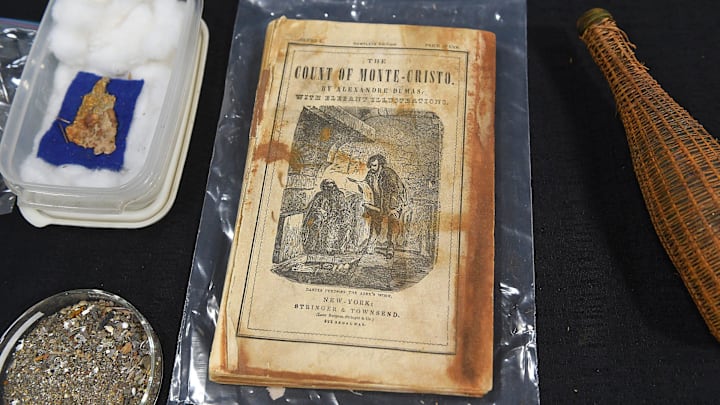I was always peripherally aware of The Count of Monte Cristo; it feels like I've always known of its existence. It wasn't until earlier this year, though, that I finally paid attention.
Overview
The Count of Monte Cristo, by Alexandre Dumas, is a French novel written in the 1840s, with a page count of over 1000+ pages (the specifics get skewed depending on which edition you read). The novel was written with a collaborator and was released by chapter over the course of several years.
In the aftermath of Napoleon in the early 1800s, France is precarious political state. Edmond Dantes, the main character, has just returned to France from a sailing venture, and is in a good state: he got a promotion, can marry the woman he loves, and has good connections. Behind the scenes, three people betray Dantes and get him imprisoned under a false accusation that he supports the exiled Bonaparte.
While he's imprisoned Dantes meets someone who helps him realize just how he ended up there, and gives him something to cling to. Over the course of decades, Dantes finds purpose in the prospect of revenge, finding answers, and seizing opportunities.
Why I Gave The Count of Monte Cristo 5 Stars
As I mentioned in my introduction, I was aware of The Count of Monte Cristo, but I never quite knew what to expect from it. I knew it was a classic, and gauged that it was an adventure story from the few times I had googled it before I committed to reading. Admittedly, it took me a significant portion of the novel to realize what I should be expecting. The beauty is that that's the point.
The Count of Monte Cristo is written in a way that I find impressive because the of effort and care to craft a masterful, cohesive, and surprising story. Everything becomes intentional as the story develops, characters are introduced, and connections are shown. The audience is perpetually kept on their toes as pieces of the puzzles continued to be revealed. Simultaneously, this exposes the best and worst qualities of these characters and makes their moral ambiguity quite raw. I find it fascinating that there are never clear heroes and villains, but an exploration of people who make choices dictated by their desires, circumstances, and affiliations.
I also have to highlight the impressive thematic layers of the novel. Dantes is haunted for over a decade because of his imprisonment and wants revenge for not only his suffering but the time he lost. Reflecting the main plot and character, The Count of Monte Cristo emphasizes the desire for revenge and justice but reflects on the potential costs. On the other hand, it also explores the path to redemption and what is too far to be redeemed. It also explores so much more: themes of love, hope, death, deception, ambition, influence, and power are all touched upon and tied into the path of Dantes and other characters.
Conclusion
Through the last 10% of the novel, my expectations were still challenged. I was furiously reading to see how this dramatic tale would finally end, and honestly, I still haven't completely worked out my thoughts on it. What I am certain of, is that to its bitter end, The Count of Monte Cristo had me in a thoughtful and analytic mood. It's a high compliment from me to say that I wish I read this in school to have a chance to write a full-fledged research paper dissecting it.
The Count of Monte Cristo won't be everyone's cup of tea: it's very long, sometimes hard to follow, and sometimes a question of why you're continuing. However, its sense of adventure and drama is immersive and contemplative. That's certainly why I'm still thinking about it 8 months later.
